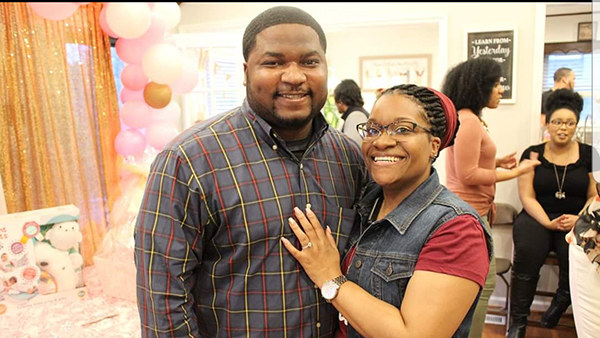Pastor Elisha Smith’s 4-year-old daughter doesn’t really understand her parents’ new work schedules.
Elisha Smith, and his wife, Chundra, both serve as officers with the Birmingham Police Department, and since peaceful protests that began on May 31 devolved into violence and destruction later that night, the Smiths have been working seven days a week.
‘A great concern’
“I really want to let her know that everything’s going to be all right,” Smith said.
“But all four of our children have a great concern for what we do, and that’s our biggest challenge at home right now.”
Smith knows the situation on the streets of Birmingham as well as anyone.
In addition to his work as a police officer, he is pastor of House of Miracles, a church plant in Birmingham’s Eastlake community.
In the days following the death of George Floyd in Minneapolis, Smith described himself as “heartbroken and disappointed” as he heard reports of yet another incident where an African American died at the hands of a fellow police officer.
“When we chose to walk in the calling of a police officer, we were sworn to fulfill the obligation to protect and serve the community,” he said. “And when someone amongst the calling tarnishes the badge and brings dishonor to something that was put in place to be effective in a positive way, it affects us directly, affects our families. Because now there’s a target on our backs. That’s where we are as a police department.”
Tension in the city’s atmosphere ran “very high” after Floyd’s death, Smith said, eventually leading to protests that devolved into violence in the early morning hours of June 1.
‘What is the answer?’
“Anger, rage, misunderstanding between people has been very present,” Smith said in an interview on June 2. “A lot of destruction has taken place within these last few days that has affected businesses, the community and families, and it’s just caused me to take a step back as a police officer and a pastor and say, ‘God, what is the answer to the chaos that is transpiring in our city?’”
The answer God gave him — fellowship.
“The Lord began to speak to me and tell me that partnership is a tool, but fellowship is what really bridges the gap between people,” Smith said. “Without fellowship, how can we walk across that bridge together into a place of agreement, understanding and love.
“I believe the solution to the chaos that has happened in our city is love,” he said. “One thing I have realized in the last few days about the people leading the rioting and protesting — I don’t think they understand what love really is. Our job is to show them the love of Christ.”
Smith said the coronavirus pandemic has been difficult on already poor communities. The economic pain also affects the church, especially a church plant like House of Miracles.
One way predominantly white churches can help address the current crisis is to help struggling churches in the inner city, Smith said.
“One way our brothers and sisters in Christ can be a blessing is to support us,” Smith said.
For example, Smith dreams of activities and games at the church to draw in youth, so “they would have things to do at a place of God instead of being corrupted by the streets.” Or funds to help single mothers when they’re in a financial crisis. But such extras are out of reach for a church plant trying to revitalize a building and keep the utilities paid.
‘A time such as this’
“I wish my white brothers and sisters would come and lend their aid in a time such as this — grab our hands and we’ll grab their hands and walk together,” Smith said. “A lot of times, pastors and others will say, ‘Let us know if you need something.’ Well, we need you.”
There is plenty of missions work to be done here in Alabama, and in Birmingham specifically — people are crying for help, Smith said, but they are not being heard.
The ministry of presence, of serving in these communities, could bring “a level of healing.”
“I am all for going abroad to do missions. God has called us to do that,” Smith said.
But missions close to home brings a particular long-term spiritual benefit, he believes.
“If I’m doing missions in Birmingham, I can drive my children to a place where we have served and see the results of our missions work. And that provides a witness to my family and my church, to your family and your church. We can actually go and see the results and continue to see the results.”
The Church for too long has been reactive rather than proactive, Smith said. That needs to change.
The time is now
“We shouldn’t wait to come up with a plan of action after something tragic has impacted the community or our city or state,” he said. “This situation, it’s impacted our whole nation. God has showed us how to be disciples. Our prayer is that we won’t be overlooked, that people will embrace the fact that there is a problem and there is a solution through the ministry of presence.”






Share with others: